- Home
- Belva Plain
Harvest Page 3
Harvest Read online
Page 3
There was a heaviness upon her, dragging her down. And the morning had begun so normally, so brightly.
The heat in the house was oppressive. Maybe Theo was right about wanting to air-condition the house. So many people were having it done these days, and the newest houses were having it built in. But it would cost so much. Last year he had added on a small conservatory, although he almost never had time to use it. He did a good deal of free clinic work; he’d even gone to Japan to treat victims of the Hiroshima blast—and incidentally had brought back a necklace of black pearls, whose price he wouldn’t tell her; but she had seen the appraisal for insurance and been shocked. He prided himself on his charity work, on keeping his fees reasonable, which was right and honorable and ethical. Still, they never got ahead, in spite of all he earned, and it frightened her. They had four children, and suppose he were to fall ill? Her mind began adding a familiar column of figures: property taxes, insurance—
The telephone rang. “We’ll pick you up for dinner at the club.” It was a neighbor’s voice. “Will seven be okay?”
“Oh, yes,” Iris said. “Seven. And thanks.”
She had forgotten. A club again, somebody else’s country club this time, where few people knew them. When strangers don’t know I’m Theo’s wife, she thought, they give me a cool stare, but as soon as they see that I belong to him, ah, then, that’s different. His reputation goes before him; he does everything so well, whether it’s tennis or bridge, and all of them with his European gallantry. I am compelled to be vivacious alongside of him, which is not my nature.
And where was he going with that woman in the car this noon?
“Oh, stop it!” She was furious with herself. “Go take a bath, take a nap, read a book, lay out your clothes, do anything, but stop this and get hold of yourself.”
In the closet hung the dress bought for Papa’s dinner. The black velvet bodice had a portrait neckline made to display a white neck and shoulders, which she had, as well as an important choker, which she also had. Made of coral, gold, and diamonds, it was original and exquisite; also, she had reason to think it hadn’t been fully paid for. The white satin skirt displayed her narrow waist, one of her best features, and had the sweep of grandeur. One had to admit that Léa knew her business. Theo was always urging her to shop there; he took pride in these expensive clothes and, she suspected, even a sensuous pleasure in the very crackle of the tissue paper when the box was opened.
“The dinner’s in the fall, and I’d like to see you in velvet,” he had suggested.
It was really he who had taught her what little she knew about fashion. Her mother had long ago given up trying, although she had made one suggestion which Iris had no intention of following, that her hair be teased into Jackie Kennedy’s new bouffant style.
She hadn’t gotten a good look at the woman in the car, only enough to see that she was dark and had long, flowing hair, so she must have been young.…
“Oh, stop it!” she cried again.
She must lift herself out of this mood. She must. She went in to run the bath water.
“You were very quiet tonight,” Theo remarked while they were driving home.
The convertible top was still down. When she laid her head back on the seat, she could see the stars rushing above the road between the dark trees on either side. It was a relief to have left the evening’s chatter and stir behind. Now, after the day’s heat, there was a touch of autumn in the air, fresh and clean on the skin. The earth was turning toward winter, away from the sun.
Theo pursued the subject. “Didn’t you have a good time?”
“It was very nice.”
“You didn’t act as if it was. You’re so remote sometimes. Without joy, when everybody else was happy.”
She sat up. “What do you mean? ‘Always’?”
“I didn’t say that. I said ‘sometimes,’ didn’t I?”
“I can find more joy in the world around me than any ten of the people there tonight. Or most of them, anyway. Just looking at these stars, I feel—”
“I’m not talking about stars. Tell me what’s wrong. Don’t pretend you don’t know what I’m talking about, Iris. Why won’t you let me help you?”
She did not answer. How could she say what was “wrong” with her without appearing to be a victim, unsure of herself and defeated?
“You’re not talking?”
“Not now. I don’t feel like it.”
“Fine. Suit yourself.”
“Just remember, Theo loves you,” Anna had said.
Now she reconstructed the evening just past. Walking to and fro, and at the table where they sat, how could she not have observed the repeated passage of eyes, his, widened, mischievous, glancing, admiring, and teasing? And the women’s eyes answering, as if there were something secret that he and they—each one of them in turn—might know. It was as if something electric were conducted between them, as if Theo were a magnet toward whom they were drawn. He both desired and was desired.
He was a man with great power. Power was even in his fingers; “magical” fingers, that young doctor had said just this morning. Command was his, and strength in the lines that hard experience had drawn upon his comely face.
A hero of the Resistance, a man who had known despair and fought it; how far beyond her reach he had seemed to the inexperienced, romantic, simple girl she had been! Perhaps she ought to have married one of the nice 4-Fs, the fellow teacher or the earnest accountant who had liked her. But there had been no fire in them, and Theo was all fire.
And she wondered now, while the silence lay between them, how far he really ever went with these parlor flirtations that were so painful for her, whether they were no more than that or whether they led to something more, to secret afternoons in bed together. And she was hot with fury, hot with anguish, at the mental image of the bed.
They rode the rest of the way without speaking. At home Theo stayed downstairs to listen to the late news. The children were all asleep, so the house was quiet. The quiet was dismal and foreboding. She undressed, showered, and sat down before the dressing table to brush her hair. All the time her mind worked, churning with bitter questions: Why did he marry me? Because of my mother’s cooking; goulash or strudel? The brush swept her dark hair over and over. His first wife, dead under Hitler’s blows, had had a cap of blond curls. How carefully Iris had studied that old photograph! She could close her eyes now and see it in every detail: the eyelet cuffs, the short, tilted nose, the dark beads around the neck. Amber? Amethyst?
She was still brushing her hair when Theo came in. The mirror over the dressing table reflected his troubled eyes.
“Iris. I know you’re miserable. And I know you’re angry. Will you be fair enough to tell me why?”
“I’m perfectly fine,” she said, proud in her misery.
“You don’t look it. And it’s not decent to go around like this without talking to me, is it?”
A lump was forming in her throat. She swallowed, before tears should follow, and still kept silent.
“Don’t you feel well? Are you ill?” he persisted.
Her lips tightened. As if you care! she thought.
“Iris, I’m trying to be patient. But I must say you’re behaving like a child.”
She swung about on the dressing-table stool. Yes, she was carrying this too far; she could see that in his face. Years before, her father’s temper, so rarely roused, had been frightening, but Theo’s control was far more threatening.
“All right, I’ll talk,” she said. “What do you want me to say?”
“Well, tell me about your day. What you did all day.”
“Nothing unusual. I had lunch at the club with my parents, and before that I did errands. So, what did you do?”
Let’s see, let’s see what he will say.
He said: “Operated in the morning, as you know, then drove straight to the office, had a sandwich at my desk, and saw patients.”
Straight to the office. To let him know?
To bury the whole business? Which to do?
He was leaning against the window frame with his arms behind him, drumming his fingers on the sill. He frowned a little, as if he were concentrating.
“What kind of errands were you doing?”
“What difference? I was shopping for the boys, if you must know. Shirts, shorts, and pajamas.”
“At the place on Parker Street near the hospital?”
“There and other places. Why?”
“You saw me.”
Iris shook her head. “No. No, I didn’t.”
“Yes, you did. You saw me and that’s what’s been bothering you all day.”
She was hot with shame. This man could strip her mind naked.
“Iris, Iris,” he said sadly. “For God’s sake, she was a nurse from the OR! She was finished for the day, her child was sick at home, and I offered her a lift a few blocks out of my way. That’s all there was to it.”
Now tears of humiliation gathered at Iris’s eyes. She lowered her head to hide them, but Theo gently raised her chin.
“Look at me. Why? Why do you make yourself miserable over nothing?”
“You lied! You were going to conceal it! You said you went straight to the office.”
“Good God, do I have to measure every word? Yes, I guess I do. I have to guard myself against your continual suspicions.”
“I think I have reason enough to be suspicious, haven’t I?”
“Oh, now we’re retracing our steps five years back down the road.… Do you have to remember every bad thing that ever happened? Grow up, Iris.”
“Why don’t you grow up and stop acting like an adolescent, making eyes at everything in skirts? The way you were tonight.”
There. She’d said it, after vowing that she would not, she had made herself vulnerable, weak, and foolish.
“You imagine things, Iris, the way you imagined I was on my way to a liaison this morning.”
“I know what I see, Theo, just as you would know if it was I making a play for some man at the table tonight.”
“Who? Who? The one in the checked sport jacket? He must weigh three hundred pounds.”
This enraged her. “Oh, do you think I’m not able to attract another man, is that it? That I can’t do better than the fat man in the checked jacket?”
“You’d better not try attracting other men. I’ll break your little neck if you do. Ah, come on, Iris, this whole thing is stupid.”
“Stupid, is it?”
“No, it’s actually more sad than anything. Wasting good energy on nonsense. Do you think so little of yourself that you believe I would change your little finger for another woman? Don’t you know I love you, Iris? After all this time, you have to be told? Shall I show you?”
As he moved to put his arms around her, she jumped up and backed against the wall.
“No, you can’t get away with that, Theo. I won’t let you this time.”
“Get away with what? What is this all about?”
He pressed her against the wall; her fists, small and inadequate, hammered his chest.
“Good! I like that. I like it when you fight me.” And he pressed her more tightly against the wall. “You like it too. I know you.” He kissed her neck. “I know you very, very well. Go on, struggle. Fight. If you can tell me what this is all about, I’ll let you go.”
She was still crying, yet she was at the point where crying turns full circle into laughter, into a mild hysteria. And she was furious because he was able—he was always able—to defuse her anger. Wasn’t that an absurd contradiction? Now his mouth was on hers and his hands were on her breasts; he could do anything he wanted with her; he was doing it and she could not stop him; she did not even want to stop him; damn him, he always won; she would never change him, never make him behave the way she wanted; he knew how she loved him; he was already carrying her to the bed.
2
A hearty country-house fire blazed beneath a marble mantel five floors above Fifth Avenue. Tall, formal windows curtained in moss-green damask overlooked cool, naked trees in Central Park, where the wind was tearing down the last bronze shreds of autumn.
A tall man, wearing a dark suit and highly polished British shoes, stood staring into the fire, jingling the keys and coins in his pockets. He might have been of any age between fifty and sixty, an old fifty or a very young sixty; he had the supple body of a tennis player. His fine aquiline face, grave now, was brightened by sea-blue eyes, which were surprising in contrast to his olive skin.
The most beautiful eyes in the world, thought the woman, who had put aside The New York Times to pay attention to him.
She was about his age, whatever that might be, thin and seemingly strong. Her skin was very white, her forehead wide and low, her shining pepper-and-salt hair parted in the center in a fashion unchanged since her youth. Her eyes were slanted, alert, and faintly Asian; she was pleasing to look at, although not nearly as handsome a person as was the man. They had been lovers for fourteen years.
Their separate apartments, since he was still a married man living with, or at least occupying the same residence as, his wife, were on opposite sides of the park. She knew that ultimately they would be married, since his wife was now dying in a nursing home. But the long wait had never troubled her; she had endured too much else. Husband and son had died in Europe. Having survived the concentration camps herself, she had come here to America and resumed the practice of medicine. Her life was full.
They made a good pair. Neither of them had ever known what it was to feel time hanging heavily. He was the head of his father’s and grandfather’s firm of private bankers, a small, prestigious firm in an old building on Wall Street; his grandfather’s portrait, wing collar, muttonchop whiskers, and all, hung opposite his desk as a reminder, he would say laughingly, of his responsibilities. And they were many. He was an active member of a dozen boards, with interest in old-age homes, symphony orchestras, museums, hospitals, a foreign policy think-tank, the Sierra Club, problems of Appalachia, American Indian reservations, the inner cities, and surely, too, of Israel.
If his wife had not been childless, he sometimes thought, he would not have had the time or the need, either, to do so much.
His wife. Poor, weak, neurotic Marian, a passive, dependent, frigid woman whom he never should have married, who possibly should not have married anyone. Why had he done it? Because, given the way the world had been in those years of the First World War and given the “proper” young man from a “proper” family that he had been, it had seemed impossible to break an honorable engagement. He could still remember with shivering distaste that fanfare of congratulations, announcements, dances and teas, the trousseau, and the Tiffany diamond.
And later, through the years? Why, a divorce would have shattered her! Never would he forget her scared eyes or her desperate pleading: “Don’t leave me, Paul. Promise me you’ll never leave me.” He could no more have hurt her than strike an infant in its bassinet.
Now, of course, she was bedridden and unconscious. He could quite simply divorce her behind her back and marry. But whether she lived for another year or died tomorrow, he would not. He would let her die with the dignity that had meant everything to her in life. Let her die as a married woman: Mrs. Paul Werner. How she had cherished the title engraved with a dark blue swirl on Crane’s best cream-colored notepaper!
Nothing had she ever known of his other life; call that hypocrisy if one wished to, but at least it had preserved their peace, her peace. Nothing had she known of the woman who sat in this room with him now, and certainly nothing of that other, so much longer ago, that other beloved girl, she of the russet hair and golden eyes, whom he had forsaken when he kept his promise to marry Marian. Nothing had she known of that single, accidental encounter long after he was married and the girl with the russet hair was married to someone else, which resulted in the birth of a child, a girl who did not know, would never know, the truth about herself.
The woman in the wing cha
ir let the paper fall from her lap. She sensed exactly what was passing through his mind, and she was soft with pity. Worldly and experienced in human foibles as a skilled physician can be, she knew how thoughtlessly a man is able to scatter his seed and move on without a thought to the harvest. But not this man.
At that moment he turned away from the fire.
“Ilse,” he said, “do you know that never a day goes by when I do not think of Iris?”
And the mother of Iris too? she might have asked, but did not. There was no jealousy in Ilse. What was past was past. She, too, had had a life and other lovers. The present alone was precious and to be savored. The future was nothing to count on. That she had learned well.
“I still think,” she told him, “you shouldn’t have gone to that dinner. It’s upset you too much. And you must have made her—Anna’s—heart stop with terror for a second or two when you walked in.”
“I’m a trustee of the Home for the Aged. It was entirely natural for me to be there.”
“I’m not questioning that. I’m thinking of the poor woman.”
“We only exchanged a few words. Very formal, in the circumstances. She knew I just wanted to see Iris.”
He had not seen either mother or daughter in years. He had given his promise to stay away, to cause no harm, and he had kept it. Except, he thought now, for the day when I hid with Ilse on the sidewalk in front of the temple where Iris was married and saw her walk out in her white dress, and saw Anna, too, on her husband’s arm as they watched their child go away. Anna. And the man who had no reason to think that Iris did not belong to him.
“They danced so well together,” he said. “A handsome young pair. A couple in love.” His voice trailed away, leaving a wistful note in the air. And he resumed, “The husband must have quite a practice. Plastic surgery, you know. Iris wore some grand jewels, I noticed. Her dress came from Leah’s place, black velvet. Leah told me what she would be wearing.” His smile flared for a second and as quickly died. “A fine thing, a fine situation, to have to pick up crumbs from my cousin about my own daughter! And if Leah didn’t happen to own Léa, the most popular dress salon in the city, I wouldn’t even have those crumbs.”

 The Golden Cup
The Golden Cup Her Father's House
Her Father's House Whispers
Whispers Crescent City
Crescent City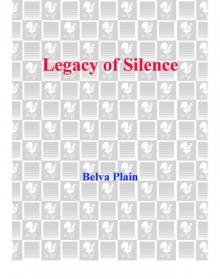 Legacy of Silence
Legacy of Silence Crossroads
Crossroads Promises
Promises After the Fire
After the Fire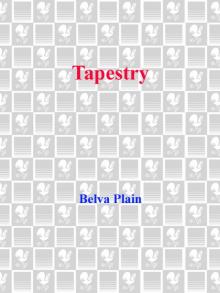 Tapestry
Tapestry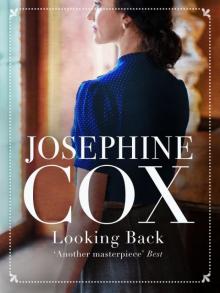 Looking Back
Looking Back Heartwood
Heartwood The Carousel
The Carousel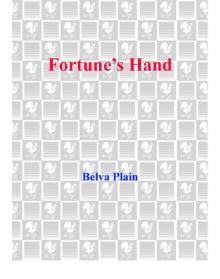 Fortune's Hand
Fortune's Hand Homecoming
Homecoming Random Winds
Random Winds Harvest
Harvest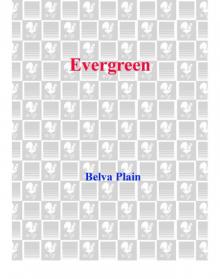 Evergreen
Evergreen Treasures
Treasures The Sight of the Stars
The Sight of the Stars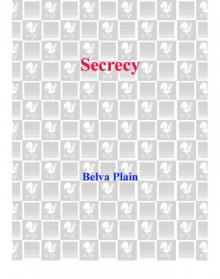 Secrecy
Secrecy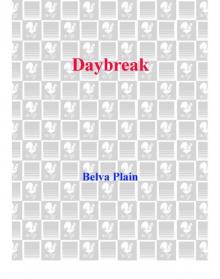 Daybreak
Daybreak Eden Burning
Eden Burning